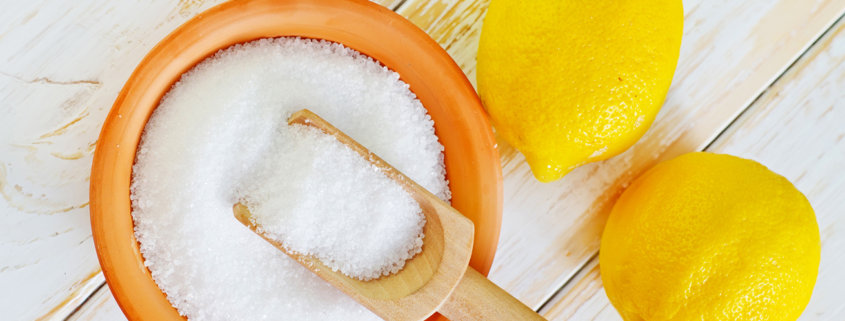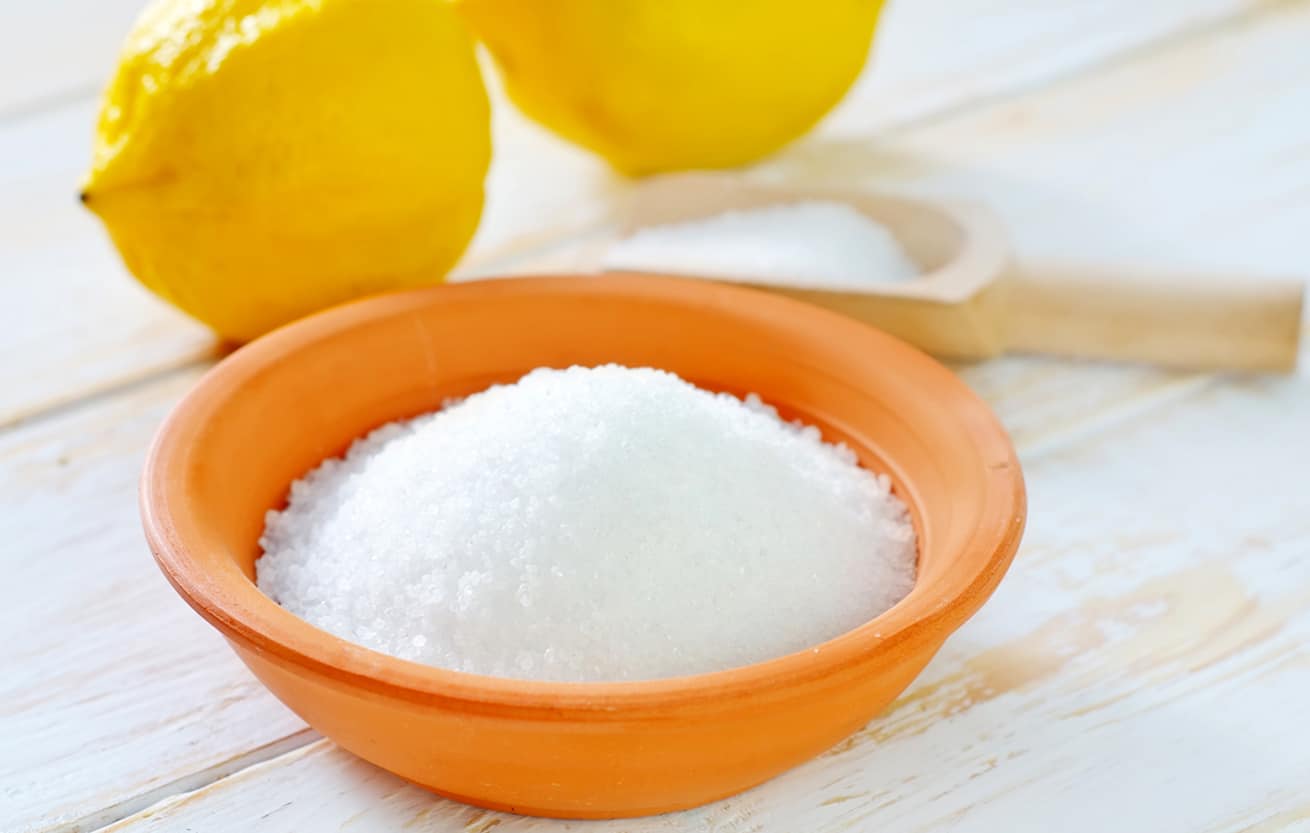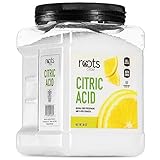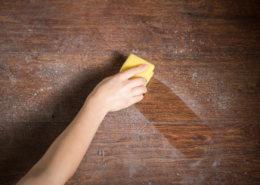15 Ways to Use Citric Acid to Clean, Descale, and Restore Just About Anything
For several months running, I was on a tear to discover all I could about citric acid. What I’ve learned, tested, and tried is amazing. So get ready as I lay out the case for adding citric acid to the list of cheap natural products we need to keep our homes sparkling clean.
What is Citric Acid?
Citric acid, also known as “sour salt,” is a colorless weak organic acid. I know, it sounds like a poisonous substance, but it is a low-level acid that’s both safe and strong enough to break down soap scum and dirt.
This acid occurs naturally in citrus fruits, such as lemons, limes, and pineapple. Mixed with water, citric acid powder makes a homemade miracle solution for most of your tough stains. It is an excellent all-purpose cleaner powerful enough to kill molds, remove soap scum, and even tackle rust. It’s not dangerous or toxic, although, as with lemon juice, you don’t want to get it in your eyes.
When added to commercial cleaning products, citric acid can help remove hard water build-up on glass. Use it to remove coffee and tea stains, yellowing/browning discolorations, hard water marks, urine stains, and more.
Where Can I Get Citric Acid?
The most basic source is to squeeze the juice from a lemon, as it contains 5% to 8% citric acid. But that is neither economical nor convenient. A much easier and more reliable version of citric acid for the uses that follow is its refined powder form. You will find citric acid in most supermarkets, at Target and Walmart with the canning supplies. Citric acid is also readily available online. A pound of citric acid will last a very long time as it takes so little to achieve fabulous results.
- 🥫 Used in canning to improve the flavor and color of some foods
- 🍃 Organic cleaner for dishwashers, coffee machines
- 💧 Removes hard water stains
- 🇺🇸 Made in the USA
Pro Tip
Breathing in citric acid dust can cause nose and throat irritation. It can also be an eye and skin irritant. You may want to protect skin and eyes and establish appropriate ventilation while working with citric acid.
How to Use Citric Acid
CAUTION: Do not use citric acid on granite, marble, painted or gold-, platinum-, or silver-trimmed dishware. Acids of any kind (vinegar, lemon juice, citric acid) can remove the very important sealants on these products. Citric acid can remove paint, or damage tstone. Do not use on painted or sealed wood surfaces, i.e. wood floors.
Make all-purpose cleaner
To make an easy-peasy, tough-as-nails homemade cleaning solution, boil two cups of water, then mix in two tablespoons of the powder. Let this Citric Acid All-Purpose Cleaner cool, then apply it to a clean cloth and wipe down any dirty surfaces. If there’s any left, pour it down the toilet to disinfect.
Deep-clean a coffeemaker
To give your coffee machine a deep clean, first, empty the carafe of any leftover coffee and empty the filter basket. Rinse the carafe and filter basket, then replace both in the machine.
Next, pour about 2 tablespoons citric acid into the carafe and fill the rest with water. Stir to dissolve. Pour this in its entirety into the reservoir and set the machine to brew.
Once brewing is complete, throw out the water in the carafe and run a second (and third, as needed) pot of clear water to sweep away any citric acid that may be lingering. Any mineral build-up inside the machine will be gone, and the glass carafe will be sparkling clean. Repeat monthly.
De-gunk the dishwasher
With regular use, hard water deposits build up in dishwashers, their hoses, and connectors. Citric acid can get in all of those small crevices to break down and remove that build-up. I have previously suggested lemon Kool-Aid for its high citric acid concentration—which works—but straight citric acid can be used directly.
Fill the empty dishwasher’s detergent cup with powdered citric acid and run as usual, set to the hottest and longest cycle without any dishes. Run a second time with regular detergent (and dishes if you want) to clear out any mineral deposits that may have lingered.
Electric or stovetop kettle
Mineral deposits build up quickly and can be difficult to remove from a tea kettle—stovetop or electric model. Boiling water and a little citric acid can take care of that; no scrubbing is required.
Fill the kettle halfway and turn it on to boil. Once it’s boiling, remove it from the stove (or switch the electric model off) and drop one tablespoon of citric acid (2 tablespoons for an extreme situation) into the water. Leave it to sit for 15 to 20 minutes. Rinse, and the pesky minerals will be gone.
Toilet bowl ring
While there are several ways to get rid of that stubborn toilet bowl ring, dissolving it with citric acid is one of the easiest. Pour one tablespoon of the powder into the toilet bowl, swish it with a toilet brush, then let it sit for 15 to 20 minutes. Flush. The bowl will sparkle like new.
Clean surface areas
By adding a couple of tablespoons of citric acid into a spray bottle filled with water—or your premade Citric Acid All-Purpose Cleaner (above), you’ll have a mixture you can use to clean your shower, kitchen countertops, and more. Avoid using citric acid on natural stone, like granite and marble, as the acid can cause damage.
Countertop oven racks
If yours are like mine, those toaster oven racks can get pretty gross with food drippings, oil, and grease that has become baked on, making them difficult to clean. A quick soak in citric acid and water can break down the grease for easy cleaning.
Put two heaping tablespoons of citric acid in a bucket (deep-sink, bathtub) of hot water so the powder dissolves. Next, add the racks and let them bathe for 20 to 30 minutes. Grease stains should come off easily with a good scrubbing brush.
Hard water deposits in humidifiers
Humidifiers are prone to a build-up of hard water deposits at the water tank base and around the heating port. If you’ve attempted to scrub this area using vinegar, baking soda, and every other thing you could think of to get it clean—without success—a good sprinkling of citric acid powder along with a brush or sponge, works wonders to remove the build-up with minimal scrubbing.
Boil six to eight cups of water, depending on the size of your humidifier, and grab your powdered citric acid. Remove the water tank and pour enough citric acid into the base to cover the surface area. Next, pour in the boiling water. Add citric acid as needed to cover the affected area. Let it sit for five minutes, then scrape away the deposits. Repeat this process as often as needed, but should be infrequent.
Descale tankless water heater
Sure, your coffeemaker needs to be “descaled” regularly, but so does that big appliance that makes hot water for the household. Good news! Citric acid is a perfect and natural solution to flush out your water heater.
To clean a tankless water heater, pour 1 cup of citric acid powder into 10 liters (about 2.5 gallons) water and pour the liquid into the cold water valve of your water heater. Let the solution sit for 8 hours. Next, connect a hose to the drain at the bottom of the heater and rinse it into a sink or large bucket. You’ll see all of the deposits flushed out into the container.
If yours is a tank-style water heater, check the owner manual for flushing and descaling, as this varies from manufacturer to manufacturer.
Water-stained windows, shower doors
Because citric acid clears out hard water, it’s a perfect solution for removing water stains on windows. Combine two tablespoons of the powder plus one cup of hot water in a spray bottle. Shake it up to dissolve the powder and spray it directly onto the window. Wait a minute, then wipe the solution away for crystal-clear windows.
Dull streaked mirrors
Citric acid is ideal for cleaning gunk, smudges, and streaks from mirrors. Fill your spray bottle with one part citric acid and one part white vinegar, and liberally spritz the mirror. Wipe with a cleaning cloth (and a squeegee, if you have one) and dry with a microfiber towel.
Dirty, stained grout
Citric acid will scrub grout for you. Just put one tablespoon of powdered citric acid into a spray bottle with two cups (16 oz)) hot water and shake to dissolve. Spray the grout and wait a few minutes, then effortlessly wipe away dirt and grime from the grout, and tile, too..
Pro Tip
General use and cleaning can wear away the all-important sealer applied when the grout was installed. It should be re-sealed at least annually.
Rusty garage and garden tools
Rust on tools like wrenches, pliers, screwdrivers, rakes, and trowels make them unpleasant, if not difficult, to use. Instead of replacing them because they’re gross and uncooperative, make up a rust removal solution with citric acid.
Make up a batch of Citric Acid All-Purpose Cleaner (see above) and pour it into a bucket or other container big enough to hold your rusted tools. Soak the items for 30 minutes to an hour, then clean with a scouring pad or brass wire brush. Continue to dunk and scrub, letting the tools sit periodically for the solution to continue to lift the rust. Dry your tools immediately, then oil them with mineral oil or clean motor oil after each use to prevent future rusting.
Dull stainless steel
Citric acid is a fabulous way to clean stainless steel appliances. Expect to remove dirt and grime you didn’t even notice was there. For sure, you’ll notice the difference afterward when those surfaces are squeaky, sparkling clean!
Mix a Citric Acid All-Purpose Cleaner (1 tablespoon to 2 cups hot water) in a spray bottle. Spray the appliances, and allow them to sit for three to five minutes. Wipe away the solution, then rinse with a wet cloth. Finally, dry with a microfiber cloth working in the direction of the grain, until completely dry and super shiny!
Grimy countertops
Citric acid is a natural and effective way to clean all sorts of surfaces, from glass stovetops to butcher blocks. Simply spray the counter with your Citric Acid All-Purpose Cleaner (see above). Let stand for one to two minutes, then rinse and wipe dry. Your countertops will not only be clean but sanitized as well. However, do not try this method on granite or marble, as the acid mixture can damage those fancier countertops’ sealant.
CAUTION: Do not use citric acid on granite, marble, painted or gold-, platinum-, or silver-trimmed dishware. Acids of any kind (vinegar, lemon juice, citric acid) can remove the very important sealants on these products; remove paint, or damage the stone. Do not use on painted or sealed wood surfaces, i.e. wood floors. Always test first!
Pro Tip
DON’T…
- Don’t Proceed Without Testing First
Test any cleaning remedy first in an inconspicuous place so you know with certainty how the perceived remedy and your specific situation will react. - Don’t Expect Immediate Results
Natural cleaning remedies are best as a prevention as opposed to a cure – use them little and often. As with white vinegar, citric acid is a fantastic alternative, but it doesn’t always work immediately, and may require patience and elbow grease. - Don’t Use on Delicate Surfaces
Citric acid has corrosive properties and should not be used on natural stone or marble. - Don’t Use on Wood Floors or Furniture with Wax Sealer
The acid can break down the coating and leave a cloudy appearance. I would avoid using this on your wood floors or furniture if they have any kind of wax or sealer on it as the acid can break down the coating and leave a cloudy appearance. - Don’t Use on Electronic Screens
Phones, laptops, tablets, tvs etc all come with oleophobic coating to reduce smudges. Citric acid can break down the coating, exposing layers meant to be protected.
DO
- Use as a Descaler It’s effective for removing soap scum, hard water stains, calcium deposits, lime and rust.
- Use as a Disinfectant
Citric acid kills bacteria, mold, and mildew. It’s great for general disinfecting and cleaning. Note that it shouldn’t be used as a disinfectant against diseases like Covid-19. - Use as a Natural Alternative to Bleach Citric acid is a versatile ingredient, and can be used in a variety of situations, including:
-
- Oven cleaners
- Dishwasher cleaners
- All-purpose cleaners
- Soap-scum removers
- Bathroom cleaners
- Carpet cleaner
- Dish soaps
- Laundry detergent
- Air fresheners
- Window cleaners
- Stain removers
Source: Purdy & Figg
EverydayCheapskate is reader-supported. We participate in the Amazon Services LLC Associates Program, an affiliate advertising program designed to provide a means for publishers to earn fees by linking to Amazon.com and affiliated sites. Thanks!
More from Everyday Cheapskate
Please keep your comments positive, encouraging, helpful, brief,
and on-topic in keeping with EC Commenting Guidelines
Last update on 2024-04-24 / Affiliate links / Images from Amazon Product Advertising API
















I’ve purchased a home with a patio tiled in maroon glazed matte tiles. Hard water from nearby lawn sprinklers have left greyish deposits. I prepared a cup of warm water with a tablespoon of citric acid granules, and applied it with a soft bristled brush to several places, rinsing with a hose after an hour. NOW the dried tile “deposit” is WHITE! And THAT is not removable! What happened??
I cannot know what these grayish deposits are. You assume mineral buildup left by hard water, but could be a reaction with some unknown thing the previous owners used on the tile.
That the citric acid changed the appearance from gray to white gives me a clue (but this is only a guess!): Something was going on, it was working but you stopped the process. If the problem truly is hardwater buildup over a long period time, an hour was probably not sufficient. The only way to know is to try again, testing in a small inconspicuous spot that doesn’t matter, this time leaving the citric acid wash longer to see what happens. Hope that helps!
My friends like the brand name tablets, one for washing machines and one for dish washers. I thought they were just too expensive. After doing some research, I just bought citric acid and it does seem to make these appliances seem more fresh. However, here you don’t mention washing machines. I hope it’s ok for the fabulous Speed Queen I am fixing to buy?
Yes!
So concerning the descaling the dishwasher.
The 1st run with the lemon kool aid needs to be empty? Right?
Yes! Start with an empty dishwasher—no dishes. Fill the detergent cup with powdered citric acid (or unsweetened lemon Kool-aid). Set to run a complete cycle set to the hottest and longest.
Run a second time with regular detergent (and dishes if you want) to clear out any mineral deposits that may have lingered.
I used to always see something called “sour salt“ in the spice aisle, but can no longer find. I’d like to make my mothers Russian cabbage borscht which required sour salt. Do you think I can use the citric acid safely?
Yes. Sour salt is another name for citric acid.
Just recently bought some citric acid, added it to the coffee maker, electric kettle, dishwasher, counter top and anything else I could think off. It works great. Super good stuff; Even sprayed the glass cooktop on the stove.
Handy for canning too.
You found another winner, can’t wait to see what you find next.
We have an outside ramp to our porch deck that is made of unfinished wood. The ramp surface has become quite stained and dark and a carpenter said that he didn’t believe that just spray washing will improve the way it looks and maybe it should just be rebuilt with new wood. Would cleaning it with citric acid solution be a good idea to try? The wood is not that old.
I don’t know if citric acid would work as you desire. But I do know tht oxalic acid is what woodworkers use to bleach wood. And I know that the common cleanser found in supermarkets and online, Bar Keepers Friend, contains mostly oxalic acid. You can purchase oxalic acid online, however be careful. It will come 100% oxalic acid so make sure you use gloves. Handle and store it according to the package directions and warning. I think I would start, however, wit Bar Keepers friend, making a past of it with water and then scrubbing a smalll area of that ramp to see how it reacts. You may want to apply, then leave it to bleach out the stains, then rinse well.
Mary, the headlights on my car are very scratched making the lights seem dim. Any suggestions for that?
How to Remove Cloudy Film from Headlight Covers Plus More Great Reader Tips
Could the citric acid all-purpose cleaner be used on my grimy cabinet doors before painting?
My first thought is yes! It would remove grime and also roughen or prepare the surface for paint. Give it a try in an inconspicuous place first … please!!
And if you don’t have ascorbic acid, you can use citric acid and lemon juice to prevent frozen peaches from turning brown.
If citric acid is the same as sour salt, then as I recall, it was always used in traditional cabbage borscht recipes.